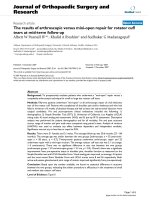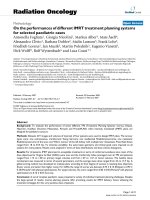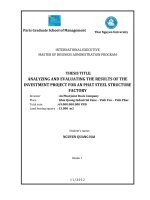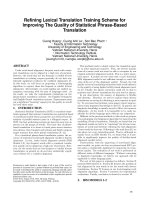Evaluating the results of applying case based payment method for normal delivery cases at Thanhnhan hospital, Hanoi (2012-2014)
Bạn đang xem bản rút gọn của tài liệu. Xem và tải ngay bản đầy đủ của tài liệu tại đây (111.87 KB, 5 trang )
JOURNAL OF MILITARY PHARMACO-MEDICINE N09-2017
EVALUATING THE RESULTS OF APPLYING CASE-BASED
PAYMENT METHOD FOR NORMAL DELIVERY CASES AT
THANHNHAN HOSPITAL, HANOI (2012 - 2014)
Chu Phuc Thi*; Pham Le Tuan**; Hoang Hai***
SUMMARY
Objectives: To evaluate the results from the implementation of case-based payment method
for normal delivery at Thanhnhan Hospital, 2012 - 2014, to compare the length of stay and level
of drugs used between two groups of women applying and not applying case-based payment
method and evaluate the service’s quality and acceptability to the new payment method.
Subjects and methods: This is a study of hospital cost analysis, using both quantitative and
qualitative methods. Data related to treatment costs of all women giving births at Thanhnhan
Hospital from January 2012 to December 2014, who voluntarily chosen the payment methods,
were collected and analyzed using SPSS 20.0. Information from in-depth interviews with health
care providers, mothers and health insurance experts was analyzed and cited according to
subject matters. Results: Applying case-based payment method has encouraged the hospital to
use resources reasonably and controlled cost raising of normal delivery cases. Group of normal
delivery women applying case-based payment method had average length of stays lower than
that of group which did not apply, ranging from 3.7% to 6.87%; the average costs of drug was
also lower among the mothers applying case-based payment method at about 17.73% to
92.91%; average of total cost in the group applying case-based payment method was lower
than that of women who do not apply from 31.05% to 62.05%. All comparisons were significant
at p value = 0.05. The women in both groups had satisfied with the quality of services received
and the stakeholders do support the new payment mechanism. Conclusions : The casebased payment method could be an appropriate option for Vietnamese hospitals for
controlling and limiting the cost increase.
* Keywords: Payment method; Case-based payment; Normal delivery; Thanhnhan Hospital.
INTRODUCTION
Reforming the mechanism of operation
and management of health financing and
hospital payment system are the priorities
for Vietnam to promote the development
of the health sector in an equitable,
effective and sustainability manner [3].
In order to achieve this goal, the Ministry
of Health has piloted case-based payment
method at Thanhnhan and Bavi Hospitals
from 2009 to 2011, and then extended the
implementation from 2012 to 2014. New
payment method should be studied and
evaluated scientifically in order to make
* Thanhnhan Hospital
** Ministry of Health
*** Vietnam Military Medical University
Corresponding author: Chu Phúc Thi ()
Date received: 18/08/2017
Date accepted: 23/11/2017
158
JOURNAL OF MILITARY PHARMACO-MEDICINE N09-2017
accurate conclusions. Therefore, we
conducted a study to evaluate the
implementation of case-based payment
method for normal delivery cases at
Thanhnhan Hospital, from 2012 to 2014
with the following objectives:
- Comparing the length of stay and
level of drugs used between two groups
of women applied and not applied casebased payment method.
- Assessing the service’s quality and
acceptability for the new payment method.
SUBJECTS AND METHODS
1. Subjects and sample size.
- All women giving births at Thanhnhan
Hospital from January 2012 to December
2014, who voluntarily selected using casebased payment method.
- Intentionally select one hospital leader,
two clinical staff members in the obstetric
department, one health insurance expert,
and 22 normal delivery women for in-depth
interviews.
2. Methods.
* Research design: Study of hospital
cost analysis, combined both quantitative
and qualitative methods.
* Viewpoint: Service provider fees
(Hospital charge).
* Study variables:
- Average length of stay, mean of drug
charge, average total charge for a normal
delivery case.
- Quality of normal delivery services
and acceptability for case-based payment
method.
* Data collection and processing: Data
on inpatient charges were extracted from
hospital financial software during 2012,
2013 and 2014. MSSQR software was used
to pairing the birth records with charged
items and length of stay; export the data
to Excel spreadsheet for cleaning; Data
were then entered, managed and analyzed
using SPSS 20.0 statistical software.
In-depth interviews were synthesized,
analyzed and cited according to subject
matters.
RESULTS AND DISCUSSIONS
1. Evaluating the results of applying case-based payment method for normal
delivery cases.
Table 1: Average length stay of normal delivery, Thanhnhan Hospital, 2012 - 2014.
Year
2012
2013
Statistics
Non case-based
payment group
Case-based
payment group
Comparing
between 2 groups
Mean SD
3.34 0.84
3.23 0.56
-3.70% (p < 0.05)
Median
3
3
-
N
1,329
222
-
Mean SD
3.28 0.76
3.13 0.47
-4.75% (p < 0.05)
Median
3
3
-
N
1,310
196
-
159
JOURNAL OF MILITARY PHARMACO-MEDICINE N09-2017
2014
Total
Mean SD
3.33 1.13
3.11 0.43
-6.87% (p < 0.05)
Median
3
3
-
N
986
161
-
Mean SD
3.32 0.90
3.16 0.86
-4.88 (p < 0.05)
Median
3
3
-
N
3,625
579
-
The average length of stay (LOS) in the group applying case-based payment method
was 3.23, 3.13 and 3.11 days, in the group of non-case-based payment method was
3.34, 3.28 and 3.33 days in 2012, 2013, and 2014, respectively. The comparison
between the two groups, applying and not applying case-based payment method,
showed that the group which applied new payment method had an average LOS less
than that of the non-applied group of 3.7%, 4.75% and 6.87%, respectively in 2012,
2013 and 2014 and statistically significant at p < 0.05.
Table 2: Average medication costs of normal delivery at Thanhnhan Hospital,
2012 - 2014.
Unit: VND
Year
Statistics
Non case-based
payment group
Case- based
payment group
Comparing between
2 groups
Mean SD
170,056 134,638
119,464 46152
42.35%
(p < 0.05)
Median
159,990
110,750
-
N
1,329
222
-
Mean SD
203,132 180,534
105,297 26,892
92.91
(p < 0.05)
Median
131,315
100,351
-
N
1,310
196
-
Mean SD
124,793 148,385
106,004 23,154
17.73%
(p < 0.05)
Median
95,204
102,359
-
N
986
161
-
Mean SD
169,698 159,225
110,926 35,387
-52.98%
(p < 0.05)
Median
125,562
104,168
-
N
3,625
579
-
2012
2013
2014
Total
Total drug costs in the group of case-based payment method was 119,464 VND in
2012 to 105,297 VND in 2013 and 106,004 VND in 2014. The comparison between the
two groups showed that the drug cost was lower in the group applied case-based
payment method from 17.73% to 92.91% and statistically significant at p < 0.05.
160
JOURNAL OF MILITARY PHARMACO-MEDICINE N09-2017
Table 3: Average of total hospital charges (excluding costs of subclinical tests),
normal delivery case, Thanhnhan Hospital, 2012 - 2014.
Unit: VND
Year
Statistics
Non case-based
payment group
Case-based
payment group
Mean SD
818,677 279,872
624,724 102,461
Comparing between
2 groups
-31.05%
(p < 0.05)
2012
Median
793,016
619,365
-
N
1,329
222
-
Mean SD
956,146 284,776
590,043 104,772
-62.05%
(p < 0.05)
2013
Median
935,594
613,324
-
N
1,310
196
-
Mean SD
1,023,967 241,523
651,893 62,401
-57.08%
(p < 0.05)
2014
Median
971,570
648,180
-
N
986
161
-
Mean SD
924,194 284,625
620,359 96,908
-48.93%
(p < 0.05)
Total
Median
901,178
631,566
-
N
3625
579
-
The total mean cost (excluding costs
for subclinical testing) in the normal delivery
group applying case-based payment method
was often lower than that of non-case-based
payment group at 31.05%, 62.05% and
57.08% for 2012, 2013 and 2014, respectively
(p < 0.05). Average for 3 years, the average
charges of normal delivery group applying
case-based payment method was 48.93%
lower than that in the group not applying
case-based payment method.
The results from applying case-based
payment method clearly demonstrated the
effect of reducing the average number of
treatment days, reducing drug costs, and
limiting cost increases when applying new
payment method for normal delivery at
Thanhnhan Hospital. Similar results also
had been reported in piloting period 2009 2011 [2] and in other international research
reports [4, 5]. Results of the study in Italy
in 2011 showed that the average cost for
the normal delivery births which applied
fee for services method was 1,166.83 euros;
263.89 euros (26%) higher than that of
diagnosis-related group (DRG) payment
method (922.94 euros) [6].
161
JOURNAL OF MILITARY PHARMACO-MEDICINE N09-2017
2 Quality of service and acceptability
for new payment methods.
In addition to the benefits achieved by
applying the case-based payment method,
some other aspects need to be considered
concurrently [1]. We assessed at and
compared the variables of the average
length of stay and drug costs. The results
showed that no patient was discharged
early and no excessive cost was cut: two
aspects that usually negatively affect the
quality of treatment for patients.
Results of in-depth interviews of women
with or without case-based payment method
showed that they were satisfied with the
services received during the labor and
delivery at Thanhnhan Hospital. Women
of both groups reported that there were no
differences in term of care at the obstetric
department, for some aspects of quality
that the women can observe and assess
by themselves (the attitudes, counseling
provision to women about postpartum care,
drug use, medical materials and services
at the maternity ward). Health insurance
and clinical staff at Thanhnhan Hospital
said that there was no reduction in giving
drugs and subclinical tests for women
applying case-based payment method to
limit the costs, because there must be a
compliance with the requirements of the
clinical pathway. Data on costs collected
also proved this matter. Similar results were
also indicated in other countries which
applying case base payment method [4, 5].
Stakeholders who involved in new payment
method: service users, representatives of
health insurance agency (service buyer)
and Thanhnhan Hospital (service provider)
expressed their support to case-based
162
payment method due to the benefits gained,
although there were some areas that need
to be improved so that new payment modality
could be deployed on a large scale.
CONCLUSIONS
The cased-based payment method could
be an appropriate option for Vietnamese
hospitals, for controlling and containing
the cost increases, promoting reasonable
use of resources, improving quality of
treatment services. Stakeholders (clinical
staff, hospital leader, health insurance
staff and service users) support the adoption
of case-based payment method.
REFERENCES
1. Ministry of Health, the Planning Department.
Hospital fee for services, case-based payment
method. 2007.
2. Nguyen Thi Thuy Nga, Bui Thi My Anh.
Overview of methods of payment for health
insurance services for providers in Vietnam.
Journal of Medicine Practice. 2013, 874 (6),
pp.179-182.
3. Pham Le Tuan. Renovating the financial
mechanism to achieve the goal of universal
health care coverage. Second Health Economics
Conference, Hanoi, November 2012. Ministry
of Health. 2012, pp.25-43.
4. Cheryl Cashin, Sheila O Dougherty et al.
Case-based hospital payment systems: A step by step guide for design and implementation
in low and middle income countries. USAID.
ZdravPlus Project. 2005.
5. John C Langenbrunner et al. Designing
and implementing health care provider payment
systems. How to manuals. The World Bank
and the USAID. 2009.
6. Pizzo Elena. An estimate of costs and
benefits of alternative methods of delivery:
an empirical analysis. Imperial College, London.
2011.









